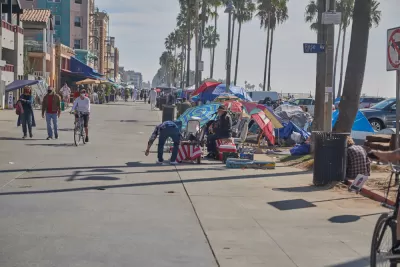Challenging common misconceptions about unhoused Californians with data.

An article for CALmatters by Marisa Kendall uses data to dispel six common myths about homelessness that don’t hold true.
While some blame California’s severe homelessness crisis on migration from other states, the data don’t bear that out: “The vast majority of people who are homeless in California are from California — and most are still living in the same county where they lost their housing, according to a recent large-scale survey of unhoused Californians conducted by the UCSF Benioff Homelessness and Housing Initiative.” The survey found that 90 percent of respondents lived in California when they lost their housing, and 66 percent were born in the state.
The misconception that most unhoused people are experiencing addiction or mental illness is also unfounded. While rates of mental illness and addiction are higher than in the general population, they do not account for a majority of people experiencing homelessness.
The article also explains the complicated process of getting temporary shelter or housing. There are a host of challenges that prevent people from accessing shelter. According to Nicole Fiore, part of the team that worked on a state report on Project Roomkey, “People will come indoors if they are offered autonomy, safety, privacy, if they’re able to keep their partners, their pets, their possessions.”
Understanding the root causes of homelessness and the challenges unhoused people face is crucial at a time when the Supreme Court opened the door for more punitive measures and criminalization with its ruling on Grants Pass v. Johnson.
FULL STORY: 6 myths about homelessness in California

Alabama: Trump Terminates Settlements for Black Communities Harmed By Raw Sewage
Trump deemed the landmark civil rights agreement “illegal DEI and environmental justice policy.”

Study: Maui’s Plan to Convert Vacation Rentals to Long-Term Housing Could Cause Nearly $1 Billion Economic Loss
The plan would reduce visitor accommodation by 25% resulting in 1,900 jobs lost.

Planetizen Federal Action Tracker
A weekly monitor of how Trump’s orders and actions are impacting planners and planning in America.

Waymo Gets Permission to Map SF’s Market Street
If allowed to operate on the traffic-restricted street, Waymo’s autonomous taxis would have a leg up over ride-hailing competitors — and counter the city’s efforts to grow bike and pedestrian on the thoroughfare.

Parklet Symposium Highlights the Success of Shared Spaces
Parklets got a boost during the Covid-19 pandemic, when the concept was translated to outdoor dining programs that offered restaurants a lifeline during the shutdown.

Federal Homelessness Agency Places Entire Staff on Leave
The U.S. Interagency Council on Homelessness is the only federal agency dedicated to preventing and ending homelessness.
Urban Design for Planners 1: Software Tools
This six-course series explores essential urban design concepts using open source software and equips planners with the tools they need to participate fully in the urban design process.
Planning for Universal Design
Learn the tools for implementing Universal Design in planning regulations.
Caltrans
Smith Gee Studio
Institute for Housing and Urban Development Studies (IHS)
City of Grandview
Harvard GSD Executive Education
Toledo-Lucas County Plan Commissions
Salt Lake City
NYU Wagner Graduate School of Public Service





























